#trad publishing
Note
Lots of people have told me I should self publish, but I think I still want to try to go through traditionally publishing my book first. I've got a finished manuscript, so how do I go about querying agents to find the best fit?
Pitching your manuscript to literary agents is a length process that requires lots of dedication, and a great deal of research. To get the most out of your querying, you definitely need to go in prepared.
We've put together this walk through for how to pitch your novel to literary agents, including some helpful do's and don'ts at the link below!
#publishing#querying agents#publishing agents#literary agents#book agents#am querying#writing asks#writing blog#writers#creative writing#writing#writing community#writers of tumblr#creative writers#writeblr#writerblr#writing tips#book publishing#trad publishing#traditional publishing#book pitch#book proposal#writer#writing advice#writing resources#writers on tumblr#writers and poets
48 notes
·
View notes
Text
When seeking commercial success with writing you need to be realistic. Just because something shouldn’t be the way it is doesn’t mean you can ignore that reality.
What I mean:
People do judge a book by it’s cover, unless you’re talented and have done your research it will negatively impact you not to pay a professional.
Marketing a book isn’t about how good your book is. It’s an entirely different skillset you’ll need to pick up whether you get indie published or traditionally published.
If you’re writing something niche you can’t expect the marketing advice of people writing and selling something with wide scale appeal to work for you. You’ll need to find a way to advertise directly to the communities that surround your niche.
Bigots read and buy books.
Publishing a book is fucking expensive but cutting corners is quickly noticeable.
Publishers don’t take as many risks as they should, they’re increasingly letting indie authors take risks and prove that certain types of story can make it. You might have to wait for someone else to prove your kind of story works in the indie space to get any traction in the trad space.
I doubt any of these really surprise anyone. But anytime something is unfair or wrong in publishing whether indie or trad I see a lot of writers say something like ‘well people shouldn’t judge a book by it’s cover so I’m making my own anyway’ as if saying that somehow changes reality. Let’s be realistic but hopeful and defiant as we head into 2023. Like the pragmatic side character who’s with the hero till the bitter end.
(Also how else are we meant to judge your book in a sea of others, when there’s so many that picking one off the shelf or clicking on to see the blurb is a decision of itself??)
#amwriting#writing community#writers community#writers#writing#writers corner#writing advice#writers advice#writing tips#writers tips#lgbt writers#fantasy writers#indie writers#selfpublishing#self publishing#publishing#trad publishing#traditional publishing#writing rants#mywritingadvice
486 notes
·
View notes
Text
Speaking as an author I ask you to watch this
youtube
I've been watching for 15 years as 'zon becomes a vortex in publishing. It owns Kindle, it owns Audible, it owns Goodreads. I have no issue with the individual services, in fact I still use Audible (although as little as possible). But the goal has always been "screw over the author for profits" and with Audible it is truly gone to extremes.
I had my books on Kindle Unlimited (which means they had to stay exclusively on KU, I could not sell them on Kobo or B&N or even on my own website), and yes, you make good money that way. I pulled them in 2022 and went "wide" (meaning, they are now available on a wide variety of sites/sellers) and yes, I took a financial hit. That's how 'zon traps authors in their ecosystem.
Please be aware that authors work on small margins, and while the worst offenders remain the Big Trad Publishers (who screw over 90% of their authors because they can), 'zon is right there with them.
I'm not asking you to stop using KU or Audible, since after all that does help authors a wee little bit to get that $0.00047 cents per page you read, but maybe try out some other retailers as well. 'Zon needs to know there is competition now.
#writing#publishing#kindle unlimited#audible#indie author#self-publishing#trad publishing#audio books#Brian Sanderson#hero of the (writing) people#Youtube
18 notes
·
View notes
Text
indie pub, trad pub, and space
I publish indie/self pub - for the non-writers of the world, that means my books are published by me, my friends, and maybe one or two professionals. The publisher's logo on the spine looks legit, but it's nowhere you've heard of.
I have some friends who "trad" publish - traditional big 5 publishers. If I said the name of the press, you'd say, oh yeah, I've heard of them.
They each have their pros and cons. But recently I had a fascinating conversation about intersectionality and space for marginalized people, and part-way through we realized we were talking at cross-purposes because of how indie vs trad think about publishing books with protags from marginalized demographics. For reference, we're both marginalized on some axes and not others.
Me: I want to get out of my comfort and write characters who I don't share their marginalizations. I'm scared that I'll do it wrong, but a lot of people who indie/self pub look and sound like me (white-passing, educated) and if we only write books about people who look and sound like us, books will be less diverse.
Me: We also need to raise up people who aren't like me to be indie/self pub authors, but a lot of that issue is structural. Indie/self pub is a somewhat expensive hobby unless you strike a gold seam, and it's hard for people without my privileges to participate in that. I will always uplift the voice of other authors, but I think part of increasing diversity needs to be increasing diversity in what I write.
Them: I will write a diverse cast, of course, but I wouldn't want to write a protagonist who doesn't share my marginalizations. Trad pub has space for X number of books of different types a year. If I write a book with an Asian protag, they sign it because they know me and like working with me, but then they might turn down an Asian author writing about an authentic Asian experience, because they're already marketing one Asian book and they don't want to dilute the marketing by doing two of the same type that year. If I publish that book, I am taking away space from someone else.
And this idea of space was so strange to me, but it explains everything. Trad publishing has only so much room on the bench. Every book they publish is a different book they say no to. This author was protecting the spot of marginalized people by not filling it themselves.
Indie publishing widens the bench. There's always room for more stories. The gatekeepers are structural inequality that makes it hard to find time and money to publish. Protecting the spot of marginalized people is me using my voice to promote their books. But maybe it's good for me to use my voice to tell a wider range of stories.
Or maybe not. We didn't come to any kind of agreement at the end of the conversation, just a deeper understanding of the issues. It was a conversation that was worth having, and that I'll have again and again, hopefully finding more wisdom in each iteration.
13 notes
·
View notes
Text
Yesterday, my trilogy went up on Goodreads and it made me unreasonably happy to see them together, all linked as the Above the Black series.
I can't wait until the actual cover reveal for book one. The temporary placeholder looks better than those Goodreads boxes for the sequels, but imagine how awesome it'll look with the official art!
I'm the only one who has reviewed the second book, haha! It's probably been read by ten people total.
And no one has read book three. I'm still writing it! 🤣
https://www.goodreads.com/series/365493-above-the-black
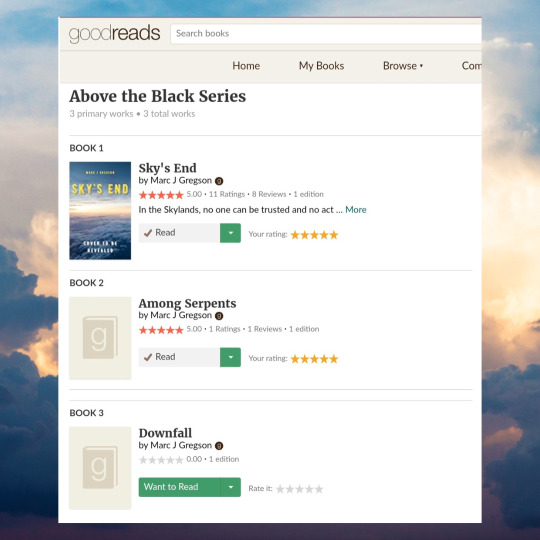
0 notes
Text
Grants for Fiction Writers
Grants for Fiction Writers
Grants for fiction writers provide a valuable resource for writers who are looking for financial assistance to fund their projects.
Grants can be used for things such as travel, research, living expenses, and more. They can also be used to cover the costs associated with publishing your work, such as a literary agent’s fees or book production costs.
Many organizations, institutions, and…

View On WordPress
#African-American#aspiring authors#black authors#black women#fiction#grants#grants for writers#Kindle Vella#loans#local grants#NEA#non-fiction#own voices#passive income#publishing#research#scholarships#self-publishing#trad publishing#writing proposal#writing retreats
1 note
·
View note
Text
MailChimp 101: Level Up Your Mailing List from the Desk of Rochelle Parry
MailChimp 101: Level Up Your Mailing List from the Desk of Rochelle Parry
An Introduction to MailChimp
MailChimp may be no Rooster, but it’s a great way to start email marketing. With a very low barrier to entry (free!), you can build your audience before your book is published!
Why Use MailChimp?
Your personal email is great for sending messages to a small group of people, but once you get a higher volume of recipients, limits will apply. For instance, Gmail will…

View On WordPress
#Audience#Author Website#AuthorCommunity#authors#Connecting with Readers#Indie Authors#Intro to Mailchimp#MailChimp#Marketing#Marketing tips#Newsletter#Published#SEO#Tips#Trad Publishing#WritingCommunity
0 notes
Text
3 Important things about Traditional Publishing
This post is for people who want to be traditionally published. If you’re down to Indie publish, or are only interested in posting your own fiction online—don’t worry about it!
First things first, traditional (or trad) publishing is when you go through an editor at a publishing house and they publish your book. They also take a hefty percentage of the profits, but handle the editing, cover design, titling, promotion, etc. for you. Sometimes you may also go through a literary agent who will represent you (send your work and advocate for you) to publishing houses.
Indie publishing (independent) is when you do it on your own, also known as self publishing. You have more control, but have to build a team behind you to help you edit, design, format, promote, etc. (or do it all yourself). and it can be difficult to get your book in places like book stores and libraries since they usually only do dealings with publishing houses.
With that out of the way, let’s talk 3 important things I know about trad publishing.
1. Don’t share your work online
If you want to be traditionally published, don’t post any of your work online anywhere. Including little bits and pieces, including excerpts, including characters, including titles. Nothing. Keep it locked down.
This is because many trad publishing contracts will consider you posting your work online as it being “previously published”, and may reject your work for that reason. To be on the safe side, don’t put any of your work online or submit it to other journals/magazines.
2. Be prepared to let go of some of the decision making.
When you go through lit agents and publishing houses, you give up an amount of creative control to get your work published. They just want to make it as good (and marketable) as possible, so trust that they know what they’re talking about.
This means they may choose your title, you may not have any control over the cover image, they might even ask you to get rid of a character or change the ending or any other amount of larger edits. You are allowed to reject some ideas, but choose your battles. Taking this feedback and making these edits is what will get your work published, so if that is your goal, be accommodating, trust that they have so much experience and will make your work better.
3. You should NEVER have to pay them
If you’re paying a traditional publisher to publish your work, you are being scammed. The money works this way:
The reader buys the book for say $20.
To make this simple, let’s say $20 then goes to the publishing house.
They take 50%, so $10 goes to your literary agent (if you have one).
They take another 50% so $5 goes to you.
Never, ever should the money be flowing the opposite direction where you are giving money to these businesses to publish your work. I will say it again, if you are paying these people, you are being scammed.
This is really important, because I knew a girl who was working three jobs to get her work published. They were asking for almost 20K. My heart absolutely breaks for her—she just didn’t know that that’s not how it’s supposed to work.
Whether it’s 20k, $100, or 3 cents. You don’t pay them.
(Of course, if you’re in indie publishing this is a whole different story. In indie, you pay people to do any of the work you don’t want to do. If you need an indie editor, you pay them, if you want an artist to design your cover, you pay them. This rule only applies to trad publishing!)
Anything else important that I missed?
#writing#creative writing#writers#screenwriting#writing community#writing inspiration#filmmaking#books#film#writing advice#traditional publishing#getting trad published#traditional publishing advice#3 important things about traditional publishing
167 notes
·
View notes
Text
listen to me carefully: books do not have to be GOOD to be worth selling or buying.
a story can be a clumsy metaphor sandwiched between two tropes and a cliche premise with a cover made in canva, and someone out there will happily eat that word jumble up, and the author totally still deserves a paycheck for writing it, and there's nothing wrong with any of that
welcome to the illustrious career of being a writer, where lurid paperbacks reign permanent and masterpieces are declared such post-mortem, and the same writer can be capable of both!
have fun and write what-ever!
#*exasperated sigh*#shouldnt have reblogged that tiktok post#it had a point but it wasnt exactly groundbreaking#writing#writeblr#writing blog#nanowrimo#creative writing#writing advice#writer advice#og#trad pub#publishing#booktok
1K notes
·
View notes
Note
As someone who just finished writing their first original novel and wants to know more about the American publishing process, where should I start? Any advice? Blogs? Articles? Twitter users?
A Writer’s Guide to Navigating the Publishing Industry
There’s something undeniably enchanting about seeing your words come to life on the printed page and connecting with readers from around the globe. The allure of sharing your ideas, stories, or even your expertise with the world is the dream for many writers.
While the idea of publishing a book may seem exciting, navigating the publishing process can be a labyrinth. It requires a blend of passion, persistence, and a solid understanding of how to wade through the murky waters.
So, let’s take a look at the ins and outs of the publishing process and what you need before you start sending your manuscript out to the world.
Identify your genre and target audience
Before you start thinking about publishing, it is essential to identify your genre and target audience.
Knowing your genre will help you determine relevant publishers and agents who specialize in that genre. Understanding your target audience will help you tailor your writing to meet their expectations. For example, if you write young adult fiction, you will want to write in a style and tone that appeals to teenagers and young adults.
Publishers and agents are all about work that sells. If you can show that you know firmly where your book sits in the market and that you know the people your book will appeal to, you will have given yourself a head start. When you publish, your work ceases to be just about you and starts being about your readers.
Get feedback on your work from editors or beta readers
Feedback is crucial for any writer. You want to make sure your work is the best it can be before submitting it to publishers or agents.
If you can afford it, consider hiring an editor to review your work. If you can’t, then try joining a writing critique group or finding beta readers who can offer suggestions and feedback.
When you receive feedback, take it seriously and use it to improve your work. Don’t be afraid to ask your readers for specific feedback, and most importantly, never take their criticism personally.
Betas are your first readers, so try to choose people who read in your chosen genre. Don’t get friends and family to beta read for you, as they’re often not the audience you’re writing for and will find it hard to give you objective opinions. Also, avoid using only other writers as your beta readers, as they’ll often approach your work from a technical view, and not from a reader’s view.
You can learn more about how to get the most out of your beta readers in this post.

How to Get The Most From Your Beta Readers
Research Publishers and Agents
Researching publishers and agents is an essential step in the publishing process. Agents often have specialisations or work closely with specific publishers, so knowing that in advance can help you avoid a lot of wasted time, and save you from unnecessary rejections.
Not only will agencies have specific types of books they look for, but each individual agent within those agencies will also have specific genres they represent. For instance, a children’s book agency might have one agent who deals only in picture books, while another represents only YA. If you pick the right agency, but the wrong agent, you’ll get a rejection, so be sure to be diligent.
Research is also important because you want to find publishers and agents who work in your who are reputable. Not all agencies are created equal, so you want to make sure you’re vetting your agents. See who they represent, and also make sure they actually manage to sell books to publishers; there are, unfortunately, a number of scam agencies out there, so it doesn’t hurt to be diligent. Check online reviews, and ask for referrals from other writers.
Want a little more help on how to vet literary agents? We got you!

How to Vet a Literary Agent
Start Querying Agents
Once you have identified a list of agents and publishers you’d like to submit to, it’s time to start querying!
Agents, and publishers if you decide to submit directly, have very strict submission guidelines, so be sure to read them carefully in the research stage. And incorrectly submitted query will be an instant rejection.
It is essential to be patient during this process as it can take time to hear back from agents and publishers. If you’d like to learn more about querying agents, we’ve got a detailed outline in the Reading Room!

How to Pitch Your Novel to Agents Like a Pro
Don’t Stop Writing
While you’re waiting for responses from agents and publishers, it’s crucial to keep writing. Do not stop writing, even if the rejections come in. This might not be the book that makes it, but you’ll learn so much from the process that it’ll be even easier to navigate the next time.
Rejections will be part of the process, so be mentally prepared for that. But throwing yourself right back into the thing you love takes away a lot of the sting.
If you love to write, keep writing, and then keep trying. There are no quick wins when it comes to publishing. It’s hard work, and it’s not always joyful. So keep your eye on the prize, and make sure you stay on that horse. The world deserves to read your words.
Resources
Twitter is a great place to find information from agents. Agents will often post threads on what they’re looking for and will announce when they’re open for submissions. There are also fantastic Twitter pitch events that can help authors find agents. You can learn more about them here.
The Writers’ and Artists Yearbook is an annual publication from Bloomsbury that covers most of the big agents and publishers, going through their genre specialisation and submission guidelines. While the majority of the book is specific to UK agents, there is a useful section on US and overseas agents, too, that will list the biggest ones.
Before querying, try to keep up to date with industry news sites like Publisher’s Weekly or The Bookseller. That way, you’ll know what kind of books are trending and get a feel for where your book sits in the market.
#writers#creative writing#writing#writing community#writers of tumblr#creative writers#writing inspiration#writeblr#writerblr#writing tips#writblr#publishing tips#traditional publishing#book publishing#publishing#trad publishing#publishing resources#querying agents#querying#literary agents#publishers#book agents#writer resources#references for writers#help for writers#publishing help#publisher#publishing industry#tips for writers#quick tips for writers
102 notes
·
View notes
Text
I feel like I need to start talking more about how one of the big things that Duck Prints Press does is open the door to people who could never even get a foot in with traditional publishing or even most medium/"small" presses (we're a small press, but we're really more of a micro-press, I see places calling themselves small presses that are fucktons bigger than we are).
I've got some anecdotal evidence that people avoid the publications of Presses like this one because they think our writing and editing standards are lower - that we're the people who failed to make it in bigger presses because we weren't good enough - and that, consciously and unconsciously, gatekeeping biases on who is and isn't qualified to write lead people to support small presses less than they might support a more established organization.
So...y'all realize that there are a lot of reasons people wouldn't pursue working with trad pub, right? and I don't even mean ethical doubts, and I don't even mean "trad pub doesn't want to publish certain kinds of stories," though those are definitely factors - we're able to give more space to play with themes and genres because we don't focus solely on "is this marketable" as a sales rubric.
But that's not what I consider the biggest difference.
Hi, I'm Claire, and I own Duck Prints Press, and I have a massive history of clinical depression, including being suicidal in the past. I'm a great writer, and I'm not just tooting my own horn, I've got almost 150,000 kudos on AO3 that suggest that just maybe, I know wtf I'm doing stringing words into sentences. I don't need a big press to tell me I'm competent, I already know that. What I do need is to not end up suicidal again. If I face the gauntlet of rejections that's supposedly "required" as part of gatekeeping trad pub, it will do severe damage to my mental health, and probably destroy my ability to write as depression-induced self-deception eats through what I know to be true.
THAT'S what's different about a micropress like ours. Yes, our founding vision was to work with fans, but the vast majority of the people who work with us have mental illnesses, physical disabilities, neurodivergence issues, and/or other "meatsuits are terrible actually" issues that strict publishing environments can't or, really, won't accommodate. We say "fuck that noise" and go out of our way to accommodate people, granting extensions and ensuring everyone can work on their own schedule. We're able to be very flexible, which means we bring in a lot of people whose incredible skills are overlooked, ignored, looked down on, kept out of, more mainstream publishing options.
If someone has trouble with deadlines? We still work with them.
If someone has an illness that flares irregularly and unpredictably? We still work with them.
If someone needs frequent reminders? We still work with them.
If someone works slowly because they can only do a little at a time? We still work with them.
If someone needs extra time, additional support, special software...we have thus far been able to accommodate literally everyone who has come to us.
As long as the creators who work with us keep communicating and keep showing at least a little progress, we will find a way to make things work, because we want to be as inclusive as possible, and because we know that most people with these challenges, no matter how good they are at writing or art or whatever it is they do with us, would face many more hardships to have these opportunities with a larger, more strict organization.
Just, every time I see indications that people think we're "less" because we're not HarperCollins or Penguin or Tor or something, I get so angry, because it shows so little understanding of how gatekeepy and especially how ableist trad pub is, and I wish more of the people who are thinking things like that would recognize that their behavior is, essentially, snobbery.
And to be clear I'm not saying "people with these challenges never get trad pubbed," that's clearly ridiculous and untrue, but I am saying, people with these challenges shouldn't have to be The Most Exceptional just to have a chance, and we deserve to have a place that will accommodate us instead of having to perform health, perform neurotypicalness, etc. just to succeed. We deserve to not have one flare-up potentially ruin our careers, and we deserve the same opportunities and respect as people who choose other directions.
Between trad pub, small press, and self-publishing, no one route is inherently "superior." Backing one over another doesn't guarantee you're only going to get good stories, or good editing. Trad pub publishes utter schlock sometimes, and self-publishing is fantastic sometimes, and some small presses do have lax standards, and some small presses are exceptional, and I feel like maybe people just really don't understand why places like Duck Prints Press try to exist - it's because we're trying to create spaces that meet us where we are, instead of focusing on rigid conformity, marketability, hard rules, etc.
The only way we'll get a diversity of voices in publishing is by supporting a diversity of publishers. The only way we'll be able to make space for everyone is by supporting the places that carve out new spaces to fit those who didn't fit elsewhere.
I wish more people would understand what we do and why we're here, and that folks would at least try our publications before assuming that we're "like big press but worse at writing/arting/editing."
Idk. I'm just tired, and sick, and still working even tho I'm sick, and frustrated with how hard it is to get anywhere, so here, have a rant I probably shouldn't post.
(this post brought to you by me seeing Chuck Tingle - entirely reasonably, to be clear, Chuck Tingle is awesome and I support him entirely! - celebrating the Camp Damascus release to thousands of notes, and Tor posting a poll about some Locked Tomb short story and getting 1300+ votes, and how I have to claw our way out of the background tumblr noise to get 100+ notes even on our biggest releases)
#duck prints press#about us#suicide mention#suicide tw#to be clear i'm in no danger now i'm well medicated#but i shouldn't have to destroy my mental health to get published actually#fuck that noise#authors shouldn't have to destroy themselves to meet the general public's delusional idea of what is success#i'm so tired y'all#why is everything so hard#i'd like to earn enough to take a paycheck some day#another big difference is that a lot of us our parents#and many of us are poor#virtually everyone i know who has succeed in trad pub is childless and has additional income streams#because those are the people who can afford to take the time and expense of writing full time
76 notes
·
View notes
Text
I think there’s something funny about picking up and reading a very much acclaimed professionally published, cited by Stephen King as being the best of the best book, and then seeing two people talk in the same paragraph, and inconsistencies in whether the character is referenced by the first or latest name in a single POV. Like, I don’t know. There’s something about it that just gets a person thinking.
21 notes
·
View notes
Text
How I Outline/Plot: Including Author Resources for Developing Characters and Self Publishing
First and foremost, everything I’ve included in this doc that references resources (such as the plot outline below), is also available for free on the authors’ respective websites. I just wanted to recreate the template Scrivener file I use when starting a new project as I’ve collected everything in one master file.
MASTER TEMPLATE GOOGLE DOC: https://tinyurl.com/boltemp
I recently posted the chapter count for my upcoming Mafia MM romance I'm writing for NaNoWriMo this year and was asked how I plot by @duckyreads
Below, I've included screenshots of the first couple beats of my process and how much detail I usually include when outlining. The template I'm working from is an edited one of Romancing the Beat by Gwen Hayes, who offers her beat sheet for free on her site and in a Scrivener Template.
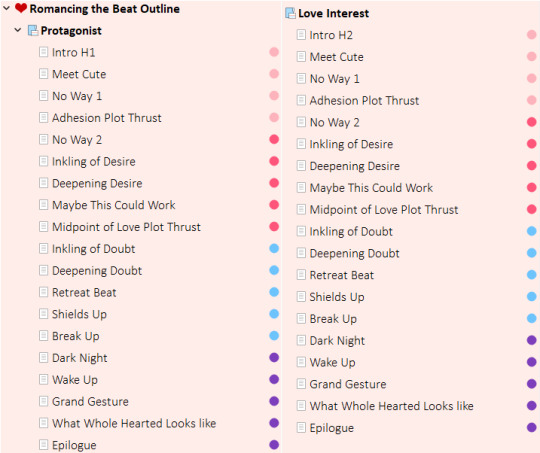
Using Romancing the Beat, I first went through and made a separate page for each story beat for my protagonist, Zac. I can't do just normal three act structure as it's too vague for me. I need Too Much to work with, then I can whittle it down later. I then did the same for the love interest and Mafia boss, Joe. (name might be changed idk yet.)
The colored dots represent which act of the story I'm in. Light pink= Act 1: Set Up, Dark Pink= Act 2: Falling, Blue= Act 3: Retreating, and Purple= Act 4: Shake it Off.
I also want to note that even though the epilogue is written in for both characters' POV, I'm only writing it once, from Zac's POV. So not every single beat necessarily translates directly into its own chapter. A few from Joe's POV are definitely combined more than once.
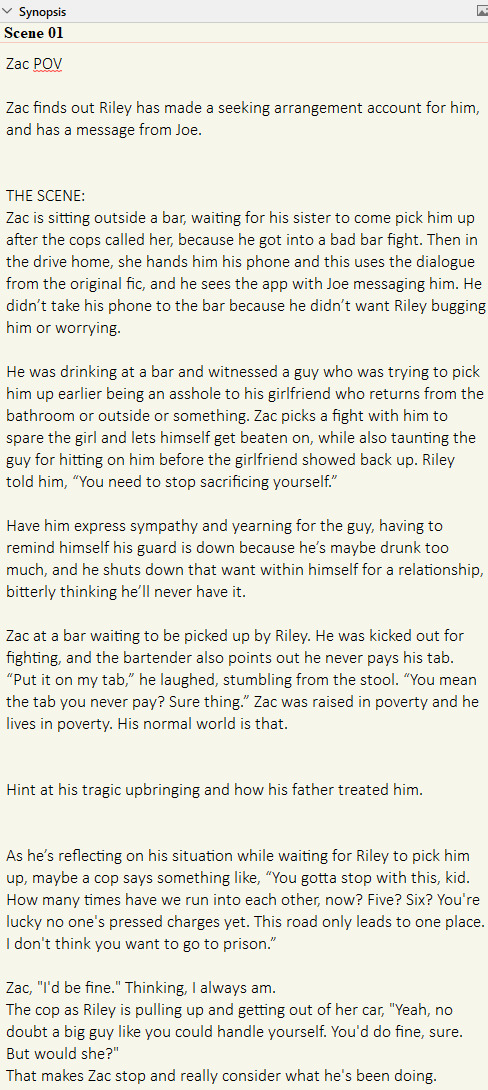
So Chapter 1, Scene 1: Zac's sister Riley has made him a dating profile and set him up on a date with who will soon be revealed as a crime lord.
I'm repetitive, because I've gone back in at different points and added little notes here and there. But my basic points I want to convey right off the bat: Zac is a hot mess who drinks to excess at times, has a sister who loves him but he is always putting her in a hard position, and has issues with money and violence from his childhood.
I also like to include some dialogue or rough snippets for scenes because it helps make the scene feel more concrete to me. I don't always do this though.
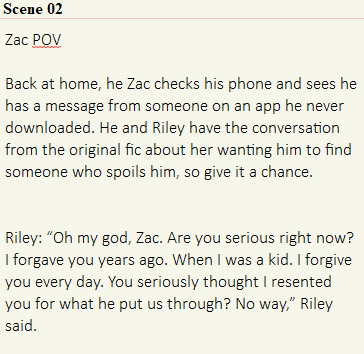
This is Chapter 1, Scene 2. Very short and to the point. (This was something I originally started writing as a fic btw.)
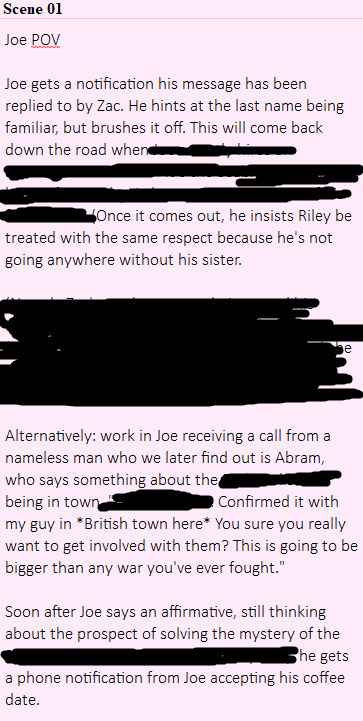
This is Chapter 2, Scene 1 and is the first from Joe's perspective.
It's plotty compared to the first chapter. I haven't done any nitty gritty location research yet so I put stuff I don't know yet in asterisks or brackets or in something like "XXX", because XXX is easy to find and change with ctrl+f > replace.
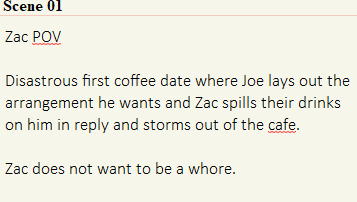
This is from Chapter 3, Scene 1. Just vibes.
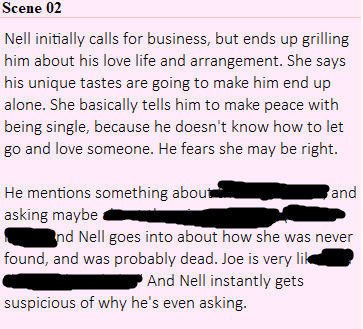
This is from Chapter 4, Scene 2, from Joe's POV after the date.
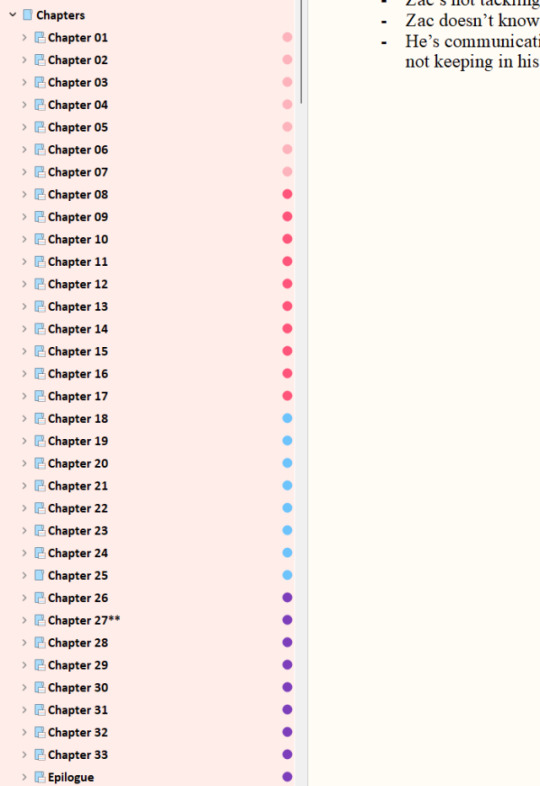
This is what I ended up with. I'm sure as I work through it, the chapter count will go down. I don't really want my romance book to be so long, but I saw recently that 50 Shades is apparently over 500 pgs, which is wild to me. I'm also doing alternating POV, so it'll be switching between my protag and the love interest.
My outlining/plotting steps:
Decide on genre and type of story structure I want to use.
Decide on my protagonist and lay out a new page/note for every story beat of whatever structure I'm using.
Go in order or jump around and write a little per beat based on how I want a scene to go. For me, feeling is more important than knowing exactly what's going to happen. I'm not naturally a plotter, so I still like to not be constrained when I'm actually writing. (ie I'm not adhering to some rigid word count per chapter.) And if I changed something or added a thing while writing, I go back to the outline after and add it in so it all lines up and I don't forget something I did.
If a beat doesn't fit its own chapter, I make it a scene. It's also okay for multiple beats to happen in one chapter too.
Do the same for any other POVs involved in the story. Try to make each character have their own arc as well, no matter how small.
Really my main advice is go with your gut first because you can always add on or retract later. Write what you want (with some awareness of genre tropes/audience wants if you're trying to write to market to some extent). All book publishing is fickle and mean a lot of the time. And honestly unless you're one of the few who gets picked up by traditional publishers and offered an amazing deal, you'll be expected to pay for all the things you'd be paying for with self publishing, except with fewer rights to your own work. I'd rather pay and manage my own website, ads, and ARC readers and retain total rights to my own creations than give my rights to a publisher who might hold my book up for years, and still expect me to fund my own advertising, book tours etc.
And besides, if you self publish, there is no rule you can't have another book (and then even your backlog) traditionally published later on. You can have both.
#self publishing#writing#indie authors#boltedfruit writes#guess that's a tag#boltedfruit fic#I get heated about how trad authors are treated especially new ones
30 notes
·
View notes
Text

A LEAP OF FAITH
In early 2021, I had a book that was dying on submission. No publisher wanted it. I'd just had some minor surgery, and I was lying in bed, feeling rather pitiful and sorry for myself.
But I had another book, SKY'S END, that my agent loved. Still, she wanted me to make major revisions for it before she'd consider sending it to publishers. She also warned me that it'd challenging to get a publisher to buy it, but if I made the revisions, she'd do all she could to find it a home.
So, while I could hardly move, I asked my wife to grab my laptop. And I took a leap of faith.
I started working. Hard. I rewrote the first 100 pages of SKY'S END. I wrote a new ending. And I revised the whole thing from past tense to present tense.
When I sent it to my agent some months later, I had faith in what I'd created. One of my reader friends read it in two days and told me, "Marc, this is the one."
Well, my agent read it, loved it too, and sent it to publishers. A few months later, it sold in the first round to Peachtree Teen.
I was ecstatic with the deal. It was life-changing news! I was getting published! But in the back of my mind, I worried about whether I'd get to write a very necessary sequel. I was only contracted for one book. And the thing is, writing a sequel is risky, especially when the sequel won't sell to another publisher. Either your original publisher loves it, or it's done. It wouldn't get thirty tries with all the different publishers.
It would have one.
Even so, I felt a pull to write this book. I HAD to write it. So, I took another leap of faith, and opened up the laptop again. Then, I put everything I had it. I put my foot on the gas pedal, and seriously threw everything I could think of at the reader. The first book is action-packed, but holy hell, just wait until AMONG SERPENTS. It's absolutely nuts. I'm serious when I say this, too. You will not be prepared.
I wrote AMONG SERPENTS for me. I wrote it because I had to write it, and I wanted to have closure--no matter what happened. But when I finished it, and my test readers threw praises at it, and my agent read the whole thing in a weekend, my confidence skyrocketed.
Maybe, just maybe, I'd written a really high-quality sequel.
Long story short, I sent it to my publisher in early February. He gave me a rough idea of when he'd start reading, and days later, he emailed my agent with an offer not just for AMONG SERPENTS, but for the final book in the trilogy, too.
My journey has never been easy. I've spent years to get to this point, but none of it would've ever been possible if I didn't take a chance.
None of it would've been possible if I didn't take a leap of faith.
0 notes
Text
Currently imagining a future in which I filed the serial numbers off The Valley of the End or In Times of Peace and got a book deal.
The world of publishing is so damn grim now. The industry seems to have forgotten that part of its job is marketing debut authors!
Sometimes it feels like, if you don't bring an established audience to them, they don't want you. Simple as that.
#sasusaku#TVOTE#publishing#fanfiction#I'm all for filing the serial numbers off fanfic and selling it! I think that's awesome#but it's fucking depressing to consider the underlying reality#which is that publishing houses don't believe in debut authors#they want to milk their established authors for easy profits#and it seems like if you don't have some kind of platform already#trad pub doesn't give a fuck how good your book is or how much potential it has#vent post
40 notes
·
View notes
Text
The number one thing I'm learning from my "would you buy direct from authors" poll is that next to no one understands what actually happens behind the scenes in publishing, but almost everyone thinks they do.
#literally mind boggling the number of confident responses saying 'publishers do X' when they've never done that#or 'self published authors can't do Y' when most [professional] self pubbed authors do exactly that#also the number of people insisting certain elements must refer to selfpub or trad that are common to both#people literally have no fucking clue how any of this stuff works but think they have phds in it wow
9 notes
·
View notes